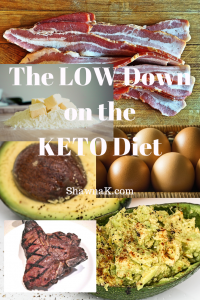❌I’m not a fan of keto dieting for a number of reasons…
🔬Let’s start with the SCIENCE first…
✳️To be clear, a keto diet is very high fat, a moderate amount of protein, and very, very low in carbs.
💡The discovery: The ketogenic diet is a legitimate tool for helping reduce seizures among epileptic children who did not respond to medication. Weight loss occurred so many jumped on this as a the latest fat loss trick.
👉🏻Ketosis is a survival mechanism triggered in the body when you go without food. 
It’s a process where your body burns fat for energy. The body converts fat to ketones, which your body can use as fuel, instead of glucose to keep you alive.
🌟It’s a wonderful, brilliant, intelligently designed, backup survival mode that your body kicks into when you’re trying to survive.
🔬This is an experimental diet that was never intended for long term use.
❌NO population in the world survives on a ketogenic diet – not even Eskimos who have a high fat diet live in ketosis.
There’s an underlying assumption that those on a keto plan become better a burning fat. This is erroneous. There are two types of fat burning:
1️⃣ Using fat for fuel is called beta-oxidation.
2️⃣ Breaking down body fat is called lipolysis.
Ketosis is the state in which your liver cannot burn fat for fuel. It can burn fat for fuel only when carbohydrate and protein are also present.
A ketogenic diet only leads to lipolysis (burning excess body fat) when it contains fewer calories than is needed, which is true of any diet. When a ketogenic diet has more calories than is needed, the extra dietary fat that is initially converted to ketones gets turned into triglycerides and stored as body fat.
In a controlled human study comparing a ketogenic diet against a high carb, high-sugar diet with the same number of calories, the high-carb diet led to more fat loss than the ketogenic diet.
There are a myriad of side effects like:
- fatigue
- diarrhea
- muscle cramps
- headaches
- hypothyroidism
- impaired athletic performance
❓Does keto dieting prevent or guard against cancer?
❌There’s virtually no evidence of this.
🔬It’s all sort of theoretical, hypothetical speculation that because cancer cells feed on glucose, that if you convert to a diet that has no glucose in it and you’re eating all fat, that the ketone bodies, cancer cells have a hard time metabolizing fat, and you’ll survive, you’ll get better.
✳️BUT there are studies to show that tumors feed on fat–like palmitic acid. Tumor cells have fat receptors, and they use those fat receptors to feed on fat and to metastasize or grow.
📝When looking at studies, it’s important to look at LONG TERM studies of 20 years plus versus short term studies of only a year or two.
💀Who cares if you lose weight in the short term if you get cancer and die from your diet in the long term?
On top of all the science…
❌It’s difficult to cut out an entire macro-nutritient and live an ‘normal’ life.
❌It’s difficult to maintain fat loss results when you stop doing the keto diet.
❌Lots of ‘weight loss’ is actually water loss due to the fact that eating carbohydrates means that your body holds a little more water (4 grams of water for every 1 gram of carb).
❌You may suffer from the ‘keto-flu’ (symptoms described above).
❌You will likely have ‘keto-breath’ which is very unpleasant.
❌You don’t learn long term eating habits that will sustain your fat loss.
If you want to discover a SUSTAINABLE way to eat, it’s time to stop the fad diets and quick fixes.
Reach out to me and let’s discuss how you can lose fat long term and feel wonderful in the process. Start with this questionnaire.




